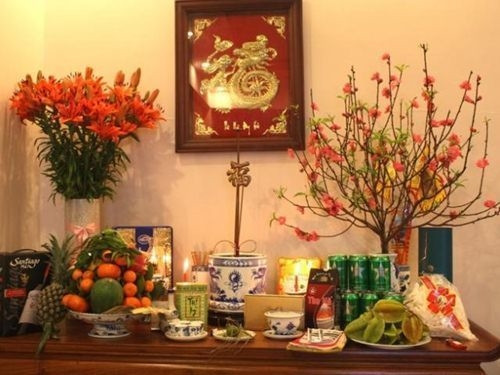When cleaning the altar, avoid moving the statues, ancestral thrones, ancestral tablets... especially the incense bowl.
For Vietnamese people, the altar is always the most sacred and respected place in every family. At the end of the year, families pay great attention to cleaning the incense bowl and cleaning the spiritual area.
However, not everyone knows how to clean properly and not violate feng shui taboos. Below are instructions from feng shui expert Nguyen Song Ha, readers can refer to to attract wealth and fortune in the year of Nham Dan 2022:
1. Altar cleaning process:
Before cleaning, light 5 incense sticks and 5 cups of water to clean the altar.
When cleaning the altar, the first thing everyone needs to do is cover the incense bowl (if the house does not have an ancestral altar). When cleaning, it should be done in order from top to bottom. When cleaning the statues, use a soft cloth to avoid scratching the statues or fading the paint.
 |
For ancestral altars or wooden ancestral tablets, wooden lotus vases, wooden vases, wooden altars, wooden beds... avoid using ginger wine, chemical alcohol, high concentration alcohol to clean as it will damage the varnish or red paint or gold plating.
For bronze statues, do not use alcohol or chemicals to clean, to avoid the bronze from oxidizing, rusting into green or quickly tarnishing.
Families should regularly trim the incense sticks and not leave them for many years because they will quickly make the altar dusty and pose a high risk of fire.
From 2022, we officially enter the transition period from the 8th period of the Eight Whites to the 9th period of the Nine Deaths. The 9th period is prone to fire disasters, so we need to be especially careful.
If the family uses a wooden altar, they should place a glass panel on the altar surface and stick wood grain decals or rough decals on the top so that the altar, altar photos, and incense bowls do not reflect the images.
After cleaning the dust or cleaning the altar items, the homeowner needs to change the water in the flower vases and the offering water. Wilted or faded flowers should be replaced immediately to avoid foul odors in the altar.
After cleaning, light 3 incense sticks and invite ancestors and gods to gather.
When cleaning the incense bowl, everyone holds the incense bowl still with one hand and wipes around the incense bowl with the other hand, wiping from the circle of Two Dragons Facing the Moon outwards.
If the incense bowl is placed close to the wall, instead of using a rag, we can use a clean wet paper towel, dipped in five-spice water, wrapped around the end of a thin stick and used to wipe behind the incense bowl.
2. Necessary items when cleaning the altar
When cleaning, prepare a broom or a special altar cleaning cloth or use a new broom or towel. Prepare a table with a red cloth on top to place the ancestral altar and ancestral tablets. If the altar has ancestral tablets with Buddhas and gods, they must be placed in two different places and not mixed together.
Due to unavoidable reasons such as the altar surface is cracked, the altar is infested with termites, the altar position is directly adjacent to the toilet on the lower floor... the altar must be moved or the incense bowl, tablet and worship items must be placed in a clean place (note to place the incense bowl, tablet of Buddha, god and ancestors separately so that they do not get mixed up) before sweeping the dust and cleaning the altar and worship items.
3. Taboos when cleaning the altar
Before cleaning the altar, everyone must abstain from eating shrimp paste, garlic, dog meat, cat meat, soft-shelled turtles, tortoises, snakes, monkeys, and from drinking alcohol soaked with tiger balm, snakes, etc.
Families should use boiled and cooled water to clean the altar. If the homeowner is more careful, they can use white wine with a little crushed ginger or water boiled from 5 herbs (dried cinnamon, dried star anise are the 2 fixed ingredients, the remaining 3 ingredients depending on the region will be 3 of the following: vang wood, cloves, eucalyptus, coriander, basil, lemongrass, pandan leaves...) to clean the worship items.
When cleaning ancestral tablets or bathing statues (Buddha statues, statues of gods of wealth...), you must use warm water, not cold water.
Never wipe the ancestral tablets before the tablets of gods and Buddhas. The ancients believed that doing so was disrespectful and an offense to gods and Buddhas.
When cleaning, avoid moving statues, ancestral altars, ancestral tablets, etc., especially the incense bowl. The incense bowl is a form of convergence of consciousness, an invisible thread connecting the living world with the underworld.
Therefore, moving the incense bowl can negatively affect that connection, making the sincerity unwitnessed and causing bad luck and disaster for the homeowner.
In case of an unavoidable incident that requires moving statues, worship objects or incense bowls, etc., after cleaning, one must repent and return them to their original positions, which is called the procedure of placing the altar and incense bowls.
When cleaning the worship space, it is taboo to let sunlight shine on the altar and incense bowls. We can turn on the electric lights to get light but do not open the door of the worship room or open the windows wide, which will damage the energy.
According to Vietnamnet